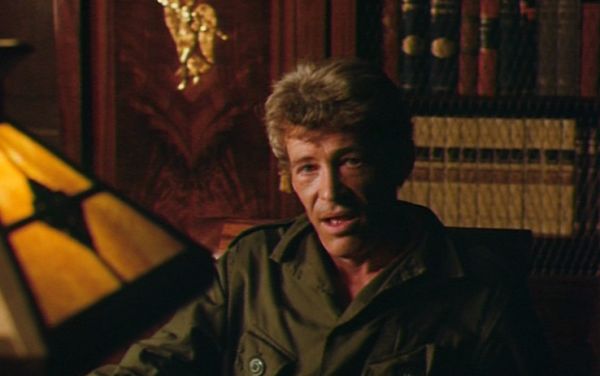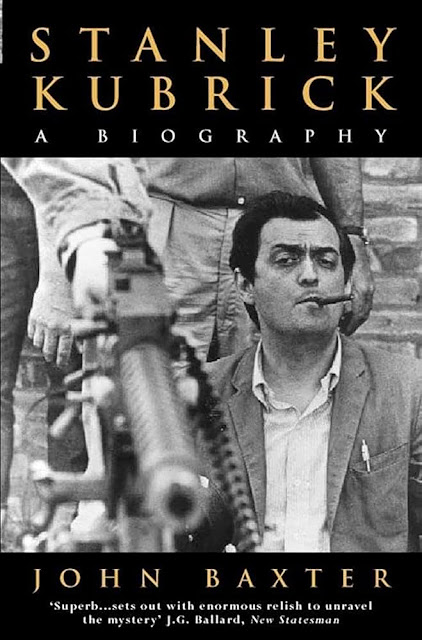Power Play (1978)
Genre Thriller / War
Country Canada / UK
Director Martyn Burke
Screenplay Martyn Burke; suggested by the book Coup d'Etat by Edward N. Luttwak
Starring Peter O'Toole, David Hemmings, Donald Pleasence, Barry Morse, Jon Granik
Running time 102 mins | Colour
A military coup in an unnamed country is the basis for this 1970s political thriller starring David Hemmings, Peter O'Toole and Donald Pleasence.
David Hemmings plays Colonel Narriman, an apparently decent army officer on the verge of retirement. Narriman is looking forward to a quiet life on his farm in the country, when he is persuaded to take part in a coup against the government. The country's current regime is authoritarian and unpleasant and the country beset by terrorist violence. Narriman himself is finally convinced of the need for action when his friends' daughter is murdered by the country's secret police.
Narriman is recruited to the plot by Dr. Jean Rousseau (Barry Morse) and he is soon rounding up his army colleagues to join him. The most important target for recruitment is a maverick tank commander, Colonel Zeller (Peter O'Toole), who will be able to give the plotters the armoured support they need to take on the rest of the government forces. But Zeller's loyalties and feelings about the government are unknown. Meanwhile, sinister government apparatchik Blair (Donald Pleasence) is aware of the plot and closing in on the men behind the coup.
 |
| Original film poster for Power Play |
Power Play was written and directed by Martyn Burke, a Canadian with a varied career as a journalist, novelist and documentary film maker - although it also includes an unlikely screenwriting credit on the Val Kilmer spy spoof Top Secret! (1984).
That Burke was a journalist and documentary film maker makes sense, given the most surprising and unusual fact about Power Play - that it has the almost certainly unique distinction of being inspired by a how-to-guide on mounting a military coup. The inspiration for the film was Edward N. Luttwak's 1968 non-fiction book Coup d'Etat, also known as Coup d'Etat: A Practical Handbook.
Power Play was set up as an Anglo-Canadian co-production. Tax incentives had helped to boost Canadian film production in the late 1970s, while at the same time independent producers in the British film industry were increasingly starved of funding. As a result, the end of the decade saw the two come together in a number of co-productions, including the sci-fi western Welcome to Blood City (1977), horror anthology The Uncanny (1977), Sherlock Holmes mystery Murder by Decree (1978) and the Alistair MacLean thriller Bear Island (1979).
Although it does have a Canadian director, as with many of these films, Power Play relies on British stars - David Hemmings, Peter O'Toole and Donald Pleasence - to help it find an audience, augmented in this case by Canadian supporting players. Although Hemmings and O'Toole were now both some way from the peak of their 1960s popularity and Pleasence was increasingly associated with horror films by this time. The film also features a cameo from Dick Cavett, who plays himself, interviewing one of the characters on his US TV talk show, just to add a sense of authenticity.
 |
| Peter O'Toole as Colonel Zeller |
Power Play not only starred David Hemmings, but was also co-produced by him. He is second billed in the credits, but his is really the leading role. Peter O'Toole was still a bigger star and so comes first in the cast list, although he barely appears in the first half hour of the film.
Ultimately Power Play doesn't really come off and its lack of specificity does become a problem. Perhaps a novel could get away with this, but in a film everything has to be portrayed visually, which does make you wonder where exactly all of this is taking place. The accents are English and North American, the country's architecture continental European and the cars French and German - while the politics are vague at best.
Power Play is a little unusual in this regard, in attempting to make a virtue of the international nature of its production. The film is very definite in not locating itself in any recognisable location. Character names are an international mix - Zeller, Rousseau, Blair, Barrientos. There is even, cheekily, one character called Stauffenberg, presumably after the plotter against Hitler. We are also shown the country's flag - green, yellow and black - to make it quite clear that this is not intended to represent anywhere specific.
Military coup d'etats were common in the 1970s, especially in Africa and South America. There were even coups in Europe, in Cyprus in 1974 and Portugal in 1974-75. That historical background now means that the film seems lost in time a little, its 1970s political background as specific to its era as its casting, film-making style and tax shelter funding.
It's not clear why David Hemmings's army officer has not noticed how unpleasant the regime he has served for so long is, his conversion to the cause of a military takeover seeming a little sudden. It's also unclear what exactly the plotters' plan for the future of the country is. They appear to be aiming to put Hemmings in charge, but for how long, on what basis and to achieve what exactly?
 |
| Donald Pleasence as Blair |
The film is also violent, unpleasantly so in places, particularly in a torture scene. It also has its unlikely elements. When the coup begins, the commanders' first instinct is just to machine gun their own soldiers guarding an airbase, without trying to overrule them or win them over to their cause.
The film is very masculine and a little macho, with military men glaring at each other, tanks rumbling around, Jeeps zooming through the streets and things blowing up, all set to Ken Thorne's often strident music. Women are there to be convenient lovers or victims; the latter shot, tortured or both.
Despite all this masculine energy, the film is slightly dreary and, whisper it, just a little bit dull. A film about a military coup, with its secret plots and counter-plots, would seem to present plenty of opportunities for intrigue and suspense, but these are mostly not taken up.
There is quite a lot of action in the last half hour, once the coup begins and the military are on the move but, without quite believing in or knowing much about these characters, this country or its politics, it all seems like too much of a game, a charade - as the film's title pretty much admits.
The fact that the film was based on a political textbook no doubt explains the under-developed characters and situations. Nothing is quite as fleshed out as it should be and the film doesn't care to build a definite picture of the country or the exact nature of the government, beyond the fact that it is a repressive regime threatened by terrorist activity. Without that, or a solid basis in the characterisations, the exercise rings hollow and uninvolving, no matter how much dramatic percussion Ken Thorne supplies on the soundtrack.
 |
| Colonel Zeller leading his tanks into action |
If the film has a message, then it's that once violence or military action is embarked upon, the full consequences of that action can never be entirely controlled or predicted, no matter how thorough the planning has been. The film concludes with a fantastically cynical twist ending that is very typical of the seventies and just the kind of thing that made going to the flicks no fun at all.
Power Play is not as engaging as a film with such a dramatic storyline should be, mainly due to its necessary vagueness and sketchy and uninteresting characters. A film as imprecise in its details as this has to be really does need to make up for it with a focus on character and motivation, something that Martyn Burke's script fails to do. It's as lacking in human interest and character development as you would expect from a film based on a political textbook.
The final result is a so-so thriller that's mostly competent, but not very exciting or inspiring. It has the feeling of everybody going through the motions; a coup mounted in a fake country by fake characters. But, as a film uniquely inspired by a how-to manual on mounting a military coup, Power Play is an interesting curio.
Cast Peter O'Toole (Colonel Zeller), David Hemmings (Colonel Narriman), Donald Pleasence (Blair), Barry Morse (Jean Rousseau), Jon Granik (Raymond Kasai), Marcella Saint-Amant (Mrs Rousseau), George Touliatos (Barrientos), Chuck Shamata (Hillsman), Gary Reineke (Aramco), Harvey Atkin (Anwar), August Schellenberg (Minh), Eli Rill (Dominique), Dick Cavett (Himself), David Calderisi (Blair's assistant), Alberta Watson (Donna), Peter Sturgess (Janitor), Doug Lennox (Stauffenberg), Robert Goodier (President), John Bayliss (Tank commander), Warren Van Evera (Old terrorist), Sandra Scott (Donna's mother), Gino Marrocco (Donna's father), Bridget McCann (Marie Narriman), Terry Doyle (Ambassador), Eugene Amodeo (Photographer), George R. Robertson (Colonel Lucas), Peter Jobin (Officer of plane), Frank Praino (Deputy Minister), Richard Moffatt (Air traffic controller), Steve Pernie (Air Controller R.I.), Harvey Sokolov (Radio operator), Alan Rosenthal (Plane pilot), Jean Cavall (Bartender), Geza Kovacs (Blair aide II), Loris Biagini (Press secretary), Jeannie Elias (Embassy girl), Sandy Crawley (Tank mechanic), Kathy May (Telephone operator), Allan Aarons (Sergeant Major)
Producer Christopher Dalton Cinematography Ousama Rawi Production designer Karen Bromley Supervising editor John Victor Smith Music Ken Thorne UK co-producer David Hemmings
Production company Magnum International Productions (Coup) Inc / Cowry Film Productions Ltd; in association with the Rank Organisation
Distributor Rank Film Distributors (UK)



Comments
Post a Comment